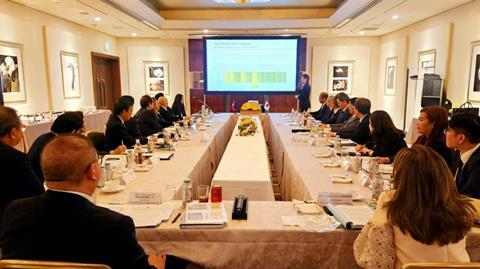Representatives from the Philippine government and industry push for tariff relief as competition in Japan grows

Philippine agriculture secretary Francisco P Tiu Laurel Jr and a high-level delegation and representatives from the Philippine banana industry have met with Japanese importers in Tokyo to address challenges to the country’s banana exports in the lucrative Japanese market.
Though the Philippines still holds the largest share of the Japanese market, supplying three out of every four bananas consumed, this figure has declined from a peak of nine out of every ten.
Bananas are a staple for Japanese consumers, who import over 1mn tonnes annually to meet demand. The forum with Japanese banana importers, which included representatives from the Pilipino Banana Growers and Exporters Association (PBGEA), focused on quality standards, tariff concerns, and ways to support the industry’s growth.
“The banana industry is a lifeline for thousands of farmers and workers, especially in Mindanao, where it serves as a major economic pillar,” said Tiu Laurel.
“To sustain and expand this industry, we must push for tariff reductions on our bananas. This will not only attract greater investment in banana production but also drive poverty alleviation, job creation, and security in Mindanao.”
Japan is the largest market for Philippine bananas and fruit remains a vital export for the Philippine island of Mindanao. Over US$1bnin annual sales and providing livelihoods to more than 700,000 Filipinos.
A major challenge for Philippine banana exporters is the high tariff under the Japan-Philippines Economic Partnership Agreement (JPEPA), which was signed in 2006. Japan collects an 18 per cent tariff on bananas exported by the Philippines from April to September and a lower 8 perc ent tariff from October to March.
In contrast, Japan imposes zero or preferential tariffs on bananas imported from and Cambodia, Laos, Mexico, and Vietnam.
Aleli Maghirang, the Philippines’ agricultural attaché in Tokyo, expressed optimism about ongoing trade negotiations between the two countries, which are promising for Philippine banana exports.
Tiu Laurel also assured continued support for banana growers battling Fusarium wilt, a soil-borne fungal disease that has significantly affected production.
Bananas were prominently featured at the Philippine Pavilion during Foodex Japan 2025, where 32 Filipino companies showcased their high-quality, export-ready products, reinforcing the Philippines’ commitment to strengthening trade ties with Japan.
Tiu Laurel met with Japan’s State Minister of Agriculture, Forestry, and Fisheries, Hirofumi Takinami, and Liberal Democratic Party Secretary-General Hiroshi Moriyama to discuss a potential review of JPEPA in light of shifting global economic conditions.
Tiu Laurel commended the Philippine Embassy in Japan and the Office of the Agriculture Attaché in Tokyo for their continued efforts in promoting Philippine agricultural exports, particularly bananas.
“This official trip mainly aims to address the pressing issue of declining competitiveness of our Philippine bananas in Japan, which is of utmost importance to the Department of Agriculture. We hope to come up with a common solution with stakeholders to address the tariff issue and negotiate mutually beneficial terms with the Japanese government under the JPEPA,” he said.



